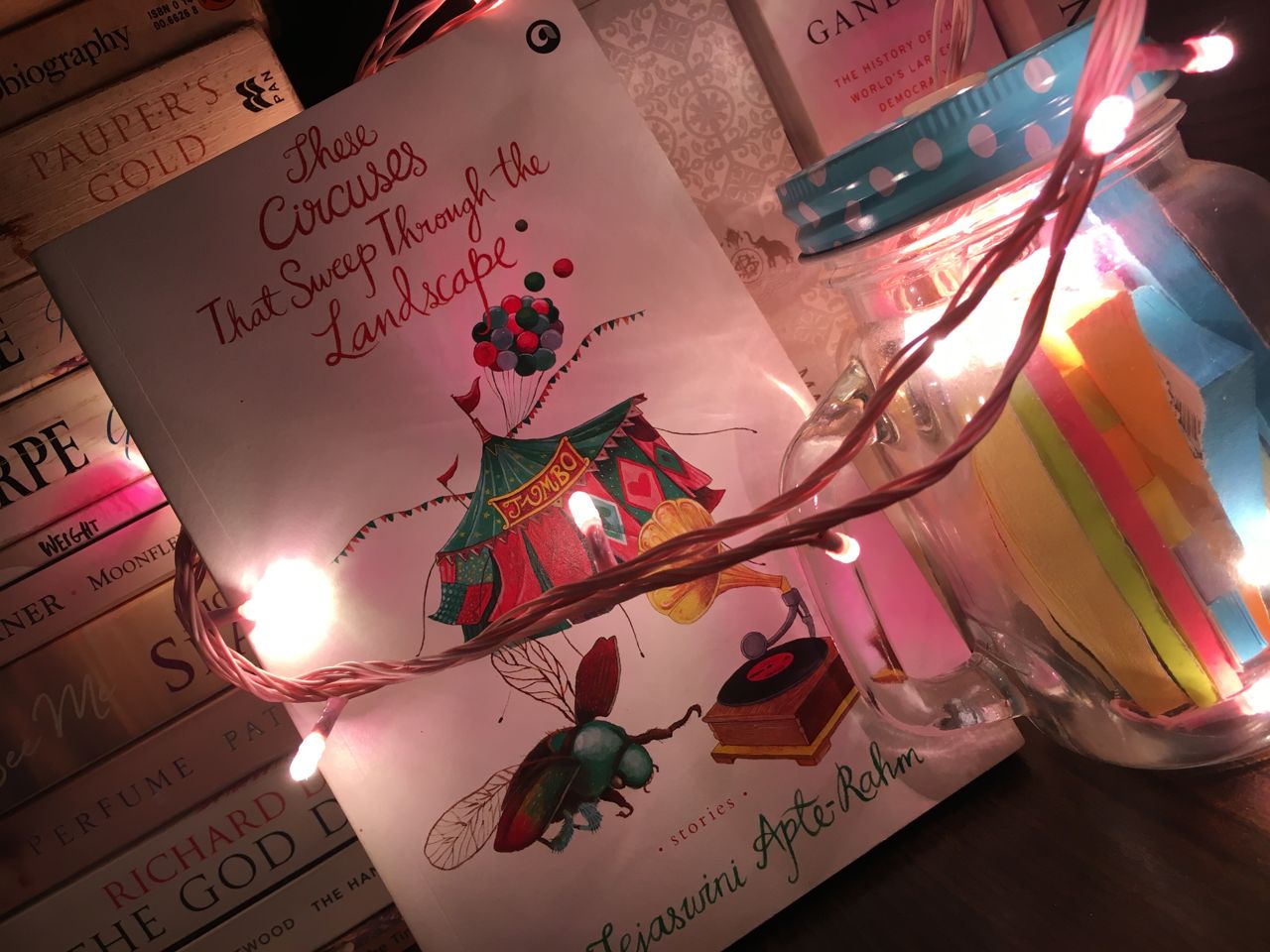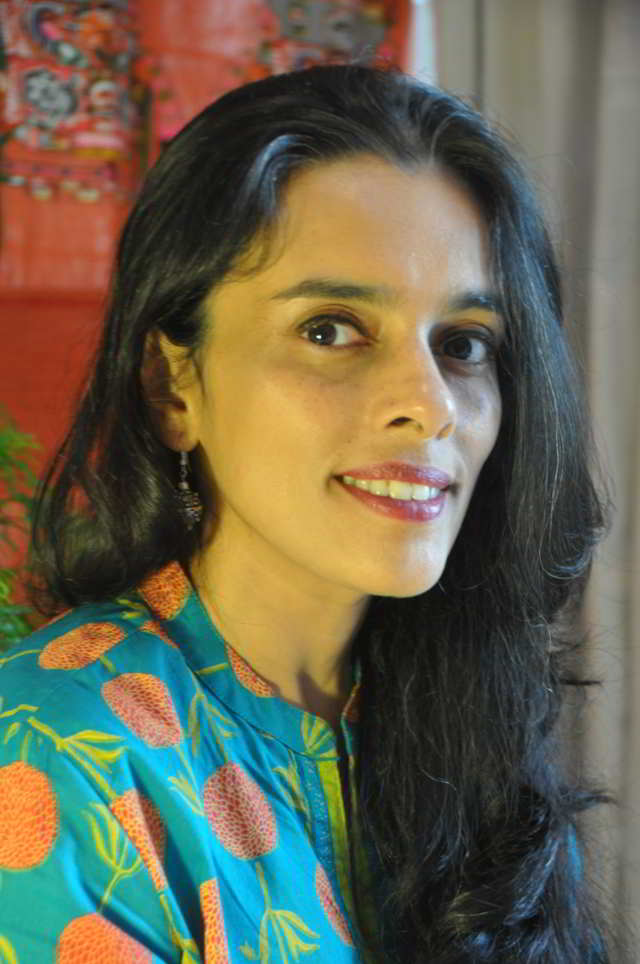We finally got a chance to have a conversation (so to speak) with the author of These Circuses that Sweep Through the Landscape, and guess what, we like her!

Author Bio
Tejaswini Apte-Rahm is the author of the short story collection These Circuses That Sweep Through the Landscape published by Aleph Book Company in December 2016.
She is a full-time writer from Mumbai.
Her short stories have been published in Himal Southasian (Nepal), BLink (Hindu Business Line, India) The Big Chilli (Thailand), Six Seasons Review (Bangladesh) and The Daily Star (Bangladesh), as well as in Monsoon Midnights, an e-book anthology of stories about Bangkok.
Tejaswini worked as an environmental researcher for ten years, during which time she wrote two non-fiction books. She was also a journalist in Mumbai, and has written on cinema, photography and environmental issues for Screen, The Times of India, Hindustan Times and The Asian Age.
She studied at the JB Petit High School for Girls (Mumbai), the United World College of South-East Asia (Singapore), the University of Sussex and the University of Kent (England).
Tejaswini has lived in Serbia, Israel, Cambodia, Thailand, Myanmar and Bangladesh, spending a year or two in each country with her husband and daughter.
Currently she is based in London.

So without further ado, let’s jump right into the interview!
Have you always wanted to write?
Yes, always. I can’t remember a time when I wasn’t scribbling down observations or fragments of a story, or even just writing down great quotes from books I was reading, and thinking about what made them so memorable. However, I never planned to be an author—if I had started out by thinking I was going to publish a collection of stories, I would probably have been too overwhelmed to continue. Only after I had written about 7-8 stories, I started wondering whether I had a story collection on my hands.
What is the toughest part of storytelling?
One of the most challenging—and enjoyable—aspects of storytelling is to create characters who are absolutely convincing in their motives and their actions. You’re basically creating a person from scratch. You have to know what that character is thinking all the time, including when he or she is ‘off-stage’. Your characters must have an internal logic; they need to be true to themselves, even if that means that they are not behaving the way I, as the author, want them to behave. To create a living, breathing character like that is not easy—but I feel this is the only way to get your readers to care about your characters. Whether the character is a hero or a charlatan or a person with shades of grey, the reader has to care about what happens to that character.
All your characters are stunning. My favorite is Mr Ghosh from ‘Homo Coleoptera’. Who is yours?
It’s difficult to choose – I’ve lived inside the heads of all my characters and I know them all so intimately. But if I had to choose, I would say it’s Diana, the main character in ‘The Girl Who Loved Dean Martin’. The story is about a girl who falls in love—true love—with Dean Martin, who was a singing superstar in the 1950s in the USA. She finds that the more she listens to his voice, the more hopelessly in love she falls with him. And she has a huge problem on her hands because when she discovers him, he has already been dead for many years. How does she cope with this impossible love? I found this dilemma fascinating, and very moving to create a character whose love ignores the limitations of time.
Different themes and so many different characters, and all so unique. Do you ever feel like you will run out of stories to tell? If so, how do you tackle the fear?
No, I don’t feel I will run out of stories to tell. If there is a fear, it is only that I will perhaps not be able to execute an idea to my liking – especially if it is something that I feel particularly passionate about. An idea for a story can be as distinct as a film running in my mind, or it can be as hazy as a fragment of music or a few murky, shifting images in my head. Either way, the challenge is to execute the truth of that idea on the page, in the written word.
Your stories are like lucid dreams. They have an inglorious flow. Do you ever suffer from writer’s block? How do you get over it?
Based on my experience so far, writer’s block is part and parcel of a writing life. There’s no avoiding it. There will be days when the words simply don’t flow. What you write will be unqualified rubbish. Or other events in your life, other anxieties, will overtake the spaces in your mind and block the creative flow. These ups and downs have to be taken in your stride. If you think of writer’s block as a phase that is going to pass, it is easier to deal with than if you think of it as an insurmountable wall that has to be attacked and brought tumbling down. I think it’s important to keep working on your project during such phases—ideally by continuing to write (even if you don’t like what you’ve written), but at the very least by editing your work, and also continuing to read and explore the work of other writers.
Which contemporary author gives you nightmares only because she might be better than you at the craft?
I’ve never thought of this question before—I guess that says it all! It’s hard to look at writing as a competition, simply because it is something I love doing. I find it more natural to simply admire other writers. A contemporary author I really admire is Amit Chaudhuri. I am currently reading his novel Odysseus Abroad. He is a master of ‘the moment’. He takes a single moment and unpacks it like a suitcase, revealing the vastness of emotion, history and action that is compressed into that one moment. And he does it in very precise language. When you read it, you say to yourself – ah, yes, of course that’s how it is! He articulates what you’ve felt in your bones without realizing it. And so reading him feels like coming home, in a way.
Recommend us one classic we need to read if we were to read just one book before we died!
I’ll recommend two, because it’s impossible for me to choose between them – Wuthering Heights by Emily Bronte, and Jane Eyre by Charlotte Bronte. I’ve loved these books for years, and re-read them so often. They are full of passion and action – both are gripping stories, but with so many deep, fascinating layers. They are novels that grow and change with you—I’ve related to them differently at different stages of my life. I recently visited Haworth village in England and the house where the Bronte sisters lived – I walked on the moors which inspired Emily to write Wuthering Heights. It was one of the most thrilling experiences I’ve ever had.
What do we get from you next?
I’m working on a novel at the moment.
Sell your book in one sentence!
These Circuses That Sweep Through the Landscape is a collection of ten dark and twisty stories, about different forms of violence, passion and love.
Any last words?
I’ll end with my favourite lines which appear at the beginning of the title story in These Circuses That Sweep Through the Landscape: “A house is full of possibilities of violence and murder. And I am not talking about the obvious potential of the kitchen. There are some pretty interesting things you could do with a screwdriver, or a hot iron, say. A kitchen knife is convenient no doubt, but maudlin. My choice of weapon is a hammer.”